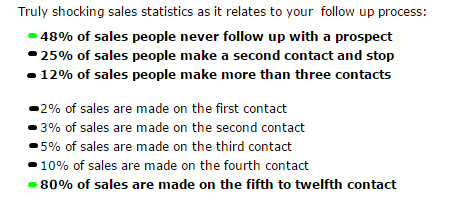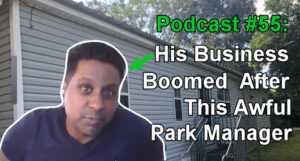Welcome back,
Over the past decade investing in mobile homes I have kicked myself for passing up, delaying, and/or missing opportunities to close easy deals right in front of me. The reasons for these missed opportunities over the years has varied from procrastination to over-analyzing, losing the deal to another buyer, personal greed, the seller pulling out, cold feet, etc. There were other times I purchased a great deal, but over-spent to rehab the home therefore reducing my profit substantially.
Below is a short list of some of the ways to ruin or spoil a mobile home investment deal. Some of these issues can happen before or after you purchase the property. Be aware of these concerns or risk duplicating the mistakes.
5 Ways To Ruin A Mobile Home Investment Deal
1. Being Too Pushy
Mobile home sellers are regular people who are looking for our help. As investors, it should be our purpose and responsibility to educate sellers and help solve their problems. Throughout the deal making process, it is important to remember to not be pushy towards a seller. Remember, a seller is buying your money with their property, so if sellers want your money they will likely follow up with you too.
Example: We can be pushy when negotiating with a seller, or while trying to set an appointment, or while setting a time to close. Make sure the seller(s) understands how you can help them, but do not be annoying or obnoxious.
2. Get Distracted or Give Up
If you have ever started something that was confusing or difficult you have likely considered throwing in the towel or at the very least gotten distracted and found yourself off course. Mobile home investing is challenging and confusing to the uninitiated. Giving up on yourself, your dreams, and local sellers is a sure way to keep your cash-flow as it is currently, and help no one in the process. Clarity is key, so make sure you have a mobile home investing plan and stick to it daily.
3. Being Too Greedy
Mobile home sellers have finely tuned detectors when it comes to manipulation and belittlement. Sellers know if you see them as a friend, a client, a partner, or just a dollar $ign. Being greedy when working with a seller can and likely will push a seller away from working with you, and for good reason. When a seller does not trust you or believe you have their interests at heart, you may often lose the deal.
4. Overpaying
Mobile homes have a finite price when selling. A 1983 3/2 doublewide is only worth so much money. Yes, there are ways to add profit to your mobile home. Also, yes, the price range will depend on the location, however, there is still a finite price for every mobile home.
Next, we must consider the risk we take as investors. With all that said, it is very important to purchase every mobile home with clear vision of the value you will be creating for yourself.
- Know what your buyers will pay.
- Know when you’ll break even.
- Know what you can sell each home for.
- Know what repairs are needed and not needed.
- Make sure you are happy with your compensation (aim high).
5. Over Repairing
“There is a buyer for every home” is a saying I heard years ago. While I believe this saying is true, I also believe in selling a quality product to a low-risk buyer, tenant-buyer or renter. The level to which you repair each mobile home investment can be based on your particular exit strategy per home.
- If you are aiming to resell for all-cash or a bank financed sale: Repair and bring to the level of other neighborhood homes. Also, consider the minimum/maximum this home will be appraised for.
- If you are aiming to sell for a payment sale or rental only: Repair what is broken, but do not over improve or upgrade the home.

6. Not Following Up
Too many investors I meet believe that hearing a seller’s “No” in response to their purchase offer(s) is a death sentence for a deal. Due to the lack of qualified buyers and competitors in the market, we mobile home investors have the unique luxury of being able to follow up with mobile home sellers well after they declined our original offer(s). Some imes a sellerA “no” is sometimes just a temporary objection. Following up is key to being remembered and closing deals with consistency.
While following up you’ll discover that: some sellers have already sold their home.
- Some sellers have already sold their home. This is great news for the sellers. Congratulate them for sure. A “no” is sometimes just a temporary objection. Following up is key to being remembered and closing deals with consistency.
- Some sellers will have decided to keep their home: Good for them. Congratulate them that they don’t have to go through the hassle of moving. A “no” is sometimes just a temporary objection. Following up is key to being remembered and closing deals with consistency.
- Some sellers will not have sold and will be willing to rediscuss their wants and needs to sell their home. Okay. Let’s try to come to a Win-Win offer.
In short, a seller’s “No” is sometimes just a temporary objection. Following up is key to being remembered and closing deals with consistency.

It is so important to have a clear plan while investing in any real estate. Mobile homes can be a great opportunity when you understand your market, mobile home buyers, mobile home sellers, and how you fit into this opportunity. Have any of these ever happened to you? Additionally, please feel free to comment below with any questions or comments you have concerning mobile home investing.
Love what you do daily,
John Fedro
Related videos:












8 Responses
Hey John,
Thank you for your site and for putting all this together. I am blown away with all the mh info you have for free. I can’t imagine what is not free. Quick question, When would you suggest is the best time to follow up with sellers?
Thank you again,
Randal gonzalez
Hi Randal,
Thanks for commenting and your kind words. This site certainly has been a labor of love. As far as follow up with sellers I suggest having a strategic plan for following up and aiming to find a win-win purchase offer with every story. However, to be more specific I use a combination of letters and calls starting 2 weeks after we make our purchase offers. The letters and calls tell the seller different things at different times depending on the seller’s unique time until they to be out of their home. I hope this helps. If you have any follow-up questions don’t hesitate to reach out.
Talk soon,
John
Hi I am intrested in buying a mobile at first to have a roof over my children head, but wasn’t to sure how I was going to put my home once I purchase it. However after seeing your video I was a little intrested in buying a selling mobile homes and property. It sounds confusing only because this something I never see myself doing or in eating my money, time, and energy on. I would love to have a moment with you and pick at your brain. Looking forward to hearing your response.
Hi Muay,
Thanks for reaching out. If it has been done before then there is no reason why you can not do the same. This business is a bit confusing at first however if you have any questions along the way don’t hesitate to reach out to me for any help. Your goal is likely very attainable with the right plan and follow through. My phone time is reserved for folks I work with and my own deals, however I would be happy to help via email. Shoot me an email with your plans, goals and thoughts and I’ll be happy to reply accordingly. My email is support@mobilehomeinvesting.net
Talk soon,
John
Enjoyed the video John. it’s nice to see you really do love what you do. it shows. Thank you
Hi Cathy,
Thanks for watching and commenting. I certainly do. 🙂
Talk soon,
John